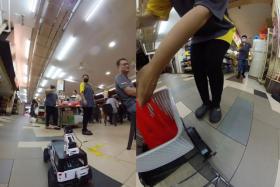Device helps elderly glaucoma patients with eye drop use
Award-winning device helps elderly glaucoma patients with using their eye drops
Remembering to use eye drops may sound like a simple task, but it is tough for most elderly patients suffering from glaucoma.
It is especially so when they suffer from memory lapses and have to grapple with up to four different bottles.
A team of doctors, staff and a medical student from the National University of Singapore (NUS) and the National University Hospital (NUH) came together to find a solution to this problem.
From there, EyeDEA - a two-in-one card and wearable that tracks the usage of eye drops among elderly glaucoma patients and reminds them when to use the eye drops - was conceptualised early last year.
The team of six has only just begun clinical trials in the pilot phase, but their innovative idea has already won them an accolade.
The team, another Singaporean team and a Thai team won the Grants4Apps Singapore challenge earlier this month, beating 77 other applicants, who were mostly from the Asia-Pacific region.
The inaugural programme - organised by Bayer Pharmaceuticals and NUS Enterprise, the entrepreneurial arm of the university - was a call for innovative health-tech solutions to improve the medication adherence of elderly people with chronic diseases across Asia-Pacific.
I have seen first-hand how difficult it can be when getting the elderly to use their eye drops. So we thought of a way to make it easier... to keep track.Ms Teri Danielle Yeoh
EyeDEA team member Teri Danielle Yeoh, 22, an undergraduate from the NUS Yong Loo Lin School of Medicine, told The New Paper that her father suffers from glaucoma.
"I have seen first-hand how difficult it can be when getting the elderly to use their eye drops.
"So we thought of a way to make it easier for the patients, as well as their families, to keep track," she said.
Dr Lai Yien, 29, a resident at the NUH Eye Surgery Centre, said the team interviewed 60 to 70 elderly patients before coming up with the idea of a card that identifies each eye drop bottle using pictures.
They then thought of a wearable that can be programmed to sound or vibrate at specific intervals to remind patients to use their eye drops and came up with EyeDEA, which stands for "eye drops electronic alarm".
NUH Eye Surgery Centre associate consultant Victor Koh, 34, said the wearable can also be programmed to track usage by scanning a QR code on each eye drop bottle, allowing doctors to download and monitor the patient's compliance.
'SIMPLE BUT IMPORTANT'
"Many elderly patients we see have trouble even remembering where they put their house keys. So we thought of a device that can beep or vibrate and they can wear as a simple but important reminder," he said.
Dr Charmaine Chai, 31, who is also an associate consultant at the NUH Eye Surgery Centre, said the device will greatly improve communication between patients and doctors.
Mr Muhammad Azri, 28, a research assistant at the NUS Yong Loo Lin School of Medicine's department of ophthalmology and the team engineer, said such a wearable will not cost much to produce.
"Our first prototype was about $100, and it will become even cheaper when we mass produce it," he said.
The team said they decided to try for the Grants4Apps Singapore challenge after hearing about it through NUS.
The other local team that won was Holmusk, which developed the Glycoleap app that monitors diabetes patients' eating habits, glucose readings, activity levels, weight and medicine adherence on a daily basis.
The winning teams received $10,000 each from the organisers and will gain access to mentorships, incubator space and global and regional networks.
Dr Lai said the EyeDEA team intend to use the money to further develop their wearable and are planning for a business model for their product, but did not give a specific timeline for the official launch.
Dr Koh said: "Innovations need not be big, but they have to be solutions that solve real-life problems, not the other way round... else it will never be a good match."
Get The New Paper on your phone with the free TNP app. Download from the Apple App Store or Google Play Store now



